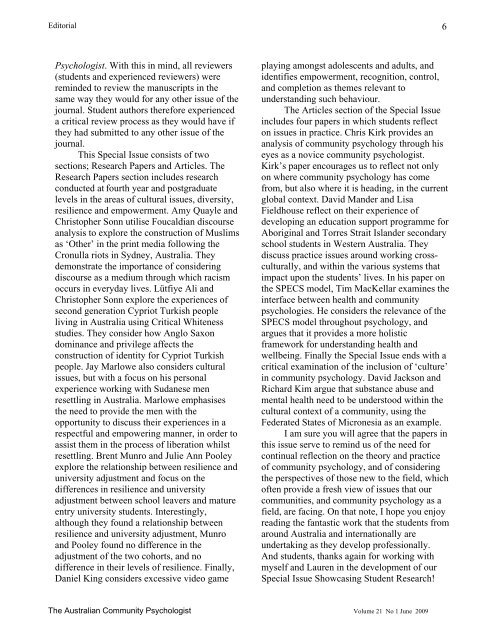issue 1 09 - APS Member Groups - Australian Psychological Society
issue 1 09 - APS Member Groups - Australian Psychological Society
issue 1 09 - APS Member Groups - Australian Psychological Society
Create successful ePaper yourself
Turn your PDF publications into a flip-book with our unique Google optimized e-Paper software.
Editorial6Psychologist. With this in mind, all reviewers(students and experienced reviewers) werereminded to review the manuscripts in thesame way they would for any other <strong>issue</strong> of thejournal. Student authors therefore experienceda critical review process as they would have ifthey had submitted to any other <strong>issue</strong> of thejournal.This Special Issue consists of twosections; Research Papers and Articles. TheResearch Papers section includes researchconducted at fourth year and postgraduatelevels in the areas of cultural <strong>issue</strong>s, diversity,resilience and empowerment. Amy Quayle andChristopher Sonn utilise Foucaldian discourseanalysis to explore the construction of Muslimsas ‘Other’ in the print media following theCronulla riots in Sydney, Australia. Theydemonstrate the importance of consideringdiscourse as a medium through which racismoccurs in everyday lives. Lütfiye Ali andChristopher Sonn explore the experiences ofsecond generation Cypriot Turkish peopleliving in Australia using Critical Whitenessstudies. They consider how Anglo Saxondominance and privilege affects theconstruction of identity for Cypriot Turkishpeople. Jay Marlowe also considers cultural<strong>issue</strong>s, but with a focus on his personalexperience working with Sudanese menresettling in Australia. Marlowe emphasisesthe need to provide the men with theopportunity to discuss their experiences in arespectful and empowering manner, in order toassist them in the process of liberation whilstresettling. Brent Munro and Julie Ann Pooleyexplore the relationship between resilience anduniversity adjustment and focus on thedifferences in resilience and universityadjustment between school leavers and matureentry university students. Interestingly,although they found a relationship betweenresilience and university adjustment, Munroand Pooley found no difference in theadjustment of the two cohorts, and nodifference in their levels of resilience. Finally,Daniel King considers excessive video gameplaying amongst adolescents and adults, andidentifies empowerment, recognition, control,and completion as themes relevant tounderstanding such behaviour.The Articles section of the Special Issueincludes four papers in which students reflecton <strong>issue</strong>s in practice. Chris Kirk provides ananalysis of community psychology through hiseyes as a novice community psychologist.Kirk’s paper encourages us to reflect not onlyon where community psychology has comefrom, but also where it is heading, in the currentglobal context. David Mander and LisaFieldhouse reflect on their experience ofdeveloping an education support programme forAboriginal and Torres Strait Islander secondaryschool students in Western Australia. Theydiscuss practice <strong>issue</strong>s around working crossculturally,and within the various systems thatimpact upon the students’ lives. In his paper onthe SPECS model, Tim MacKellar examines theinterface between health and communitypsychologies. He considers the relevance of theSPECS model throughout psychology, andargues that it provides a more holisticframework for understanding health andwellbeing. Finally the Special Issue ends with acritical examination of the inclusion of ‘culture’in community psychology. David Jackson andRichard Kim argue that substance abuse andmental health need to be understood within thecultural context of a community, using theFederated States of Micronesia as an example.I am sure you will agree that the papers inthis <strong>issue</strong> serve to remind us of the need forcontinual reflection on the theory and practiceof community psychology, and of consideringthe perspectives of those new to the field, whichoften provide a fresh view of <strong>issue</strong>s that ourcommunities, and community psychology as afield, are facing. On that note, I hope you enjoyreading the fantastic work that the students fromaround Australia and internationally areundertaking as they develop professionally.And students, thanks again for working withmyself and Lauren in the development of ourSpecial Issue Showcasing Student Research!The <strong>Australian</strong> Community Psychologist Volume 21 No 1 June 20<strong>09</strong>
















